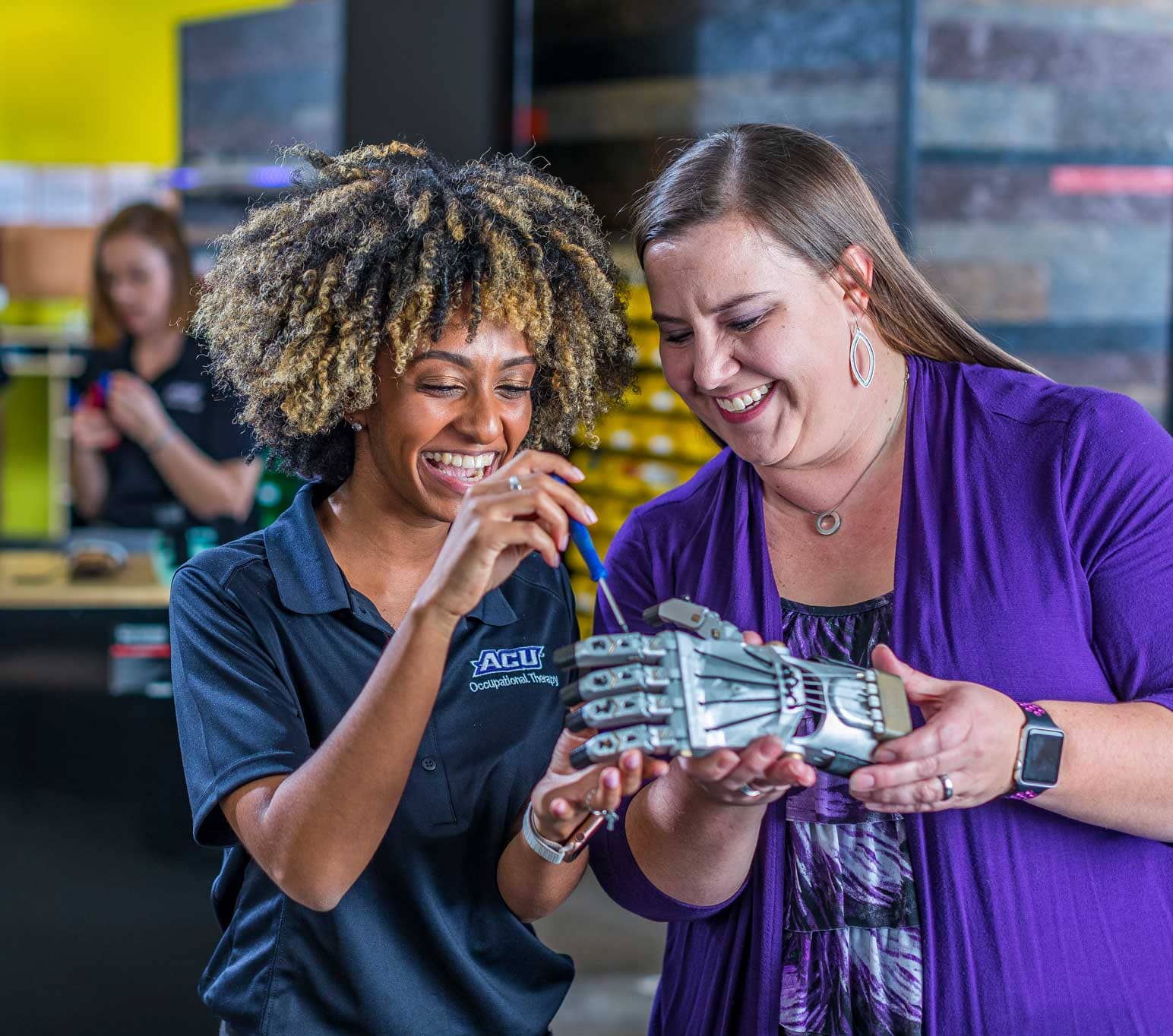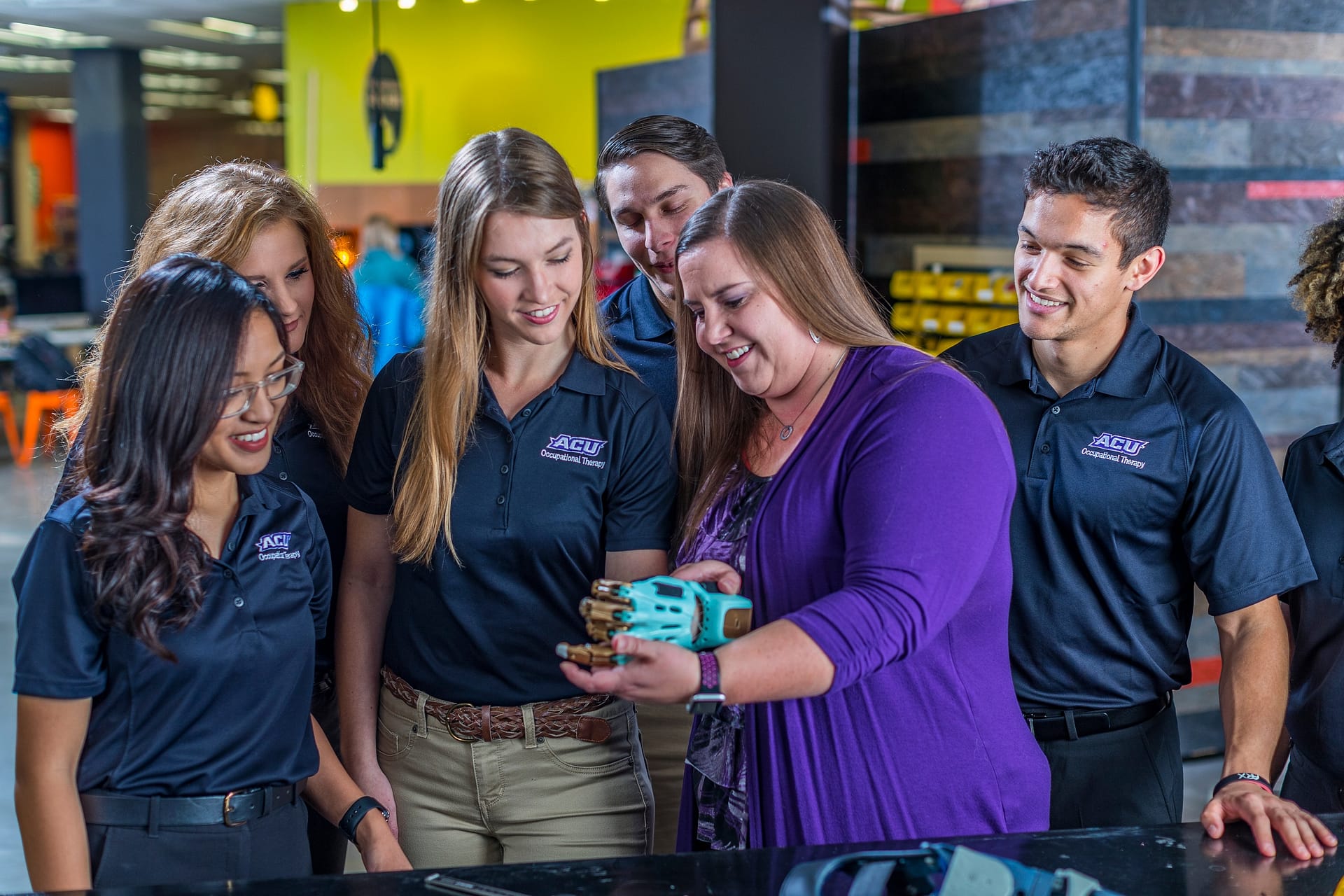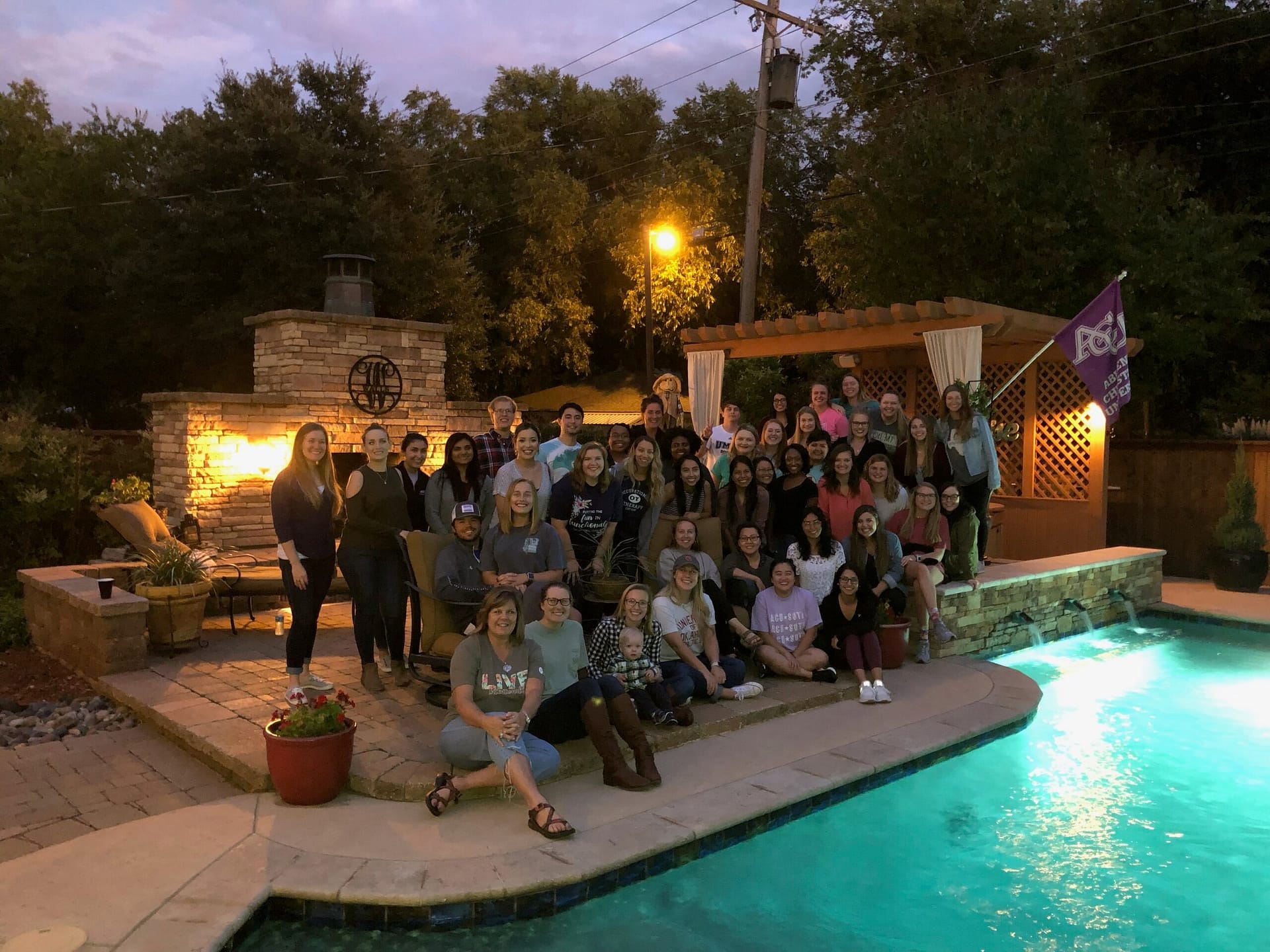Learn More
M.S. in Occupational Therapy
Applications are currently open for the Fall 2024 start date through OTCAS. We review completed applications on an ongoing basis until each cohort is filled. Applicants are encouraged to apply early to be considered for scholarships and other departmental incentives.

The Mission of the Master of Science in Occupational Therapy is to prepare occupational therapy students to think and act critically, missionally and globally in Christian service and leadership throughout their respective communities.
We believe in teaching students to recognize that occupation in its broadest sense is a great gift from God and therefore requires great responsibility. This responsibility is taught through our core values of faith, service, authenticity, innovation and competency.
Program Structure
What To Expect
These are the important details you will need to keep in mind as you prepare your application and degree plan.
The MSOT program runs for two years, starting in late August and ending with an August graduation. In addition to coursework, you’ll complete two phases of fieldwork: in level 1, you’ll do three fieldwork experiences under a licensed OT; in level 2, you’ll work through two 12-week assignments in various OT settings under direct supervision of an occupational therapist.
Graduation Requirements
Program length: 24 months
Credit hours: 69
2024/2025 tuition per credit hour: $1,193
Example Coursework
Musculoskeletal Anatomy
Neuroscience
Hand and Upper Extremity Conditions
Implementing OT Treatment
Department
Rolling Admissions
We use a rolling admissions process; applications are reviewed until the cohort is filled. For the fall start date, we generally close applications by April 5.
Frequently Asked Questions
Alumni Testimonial
Kristen Cullers, MSOT ’19
“The Master of Science in Occupational Therapy at ACU prepared me for the Houston Methodist Hand Therapy Fellowship by challenging my critical thinking, gaining proficient interdisciplinary communication skills and refining understanding of basic anatomy and physiology. The strong Christian leadership from the professors within the program has guided me to be the clinician I can be.”
The Houston Methodist Hand Therapy Fellowship program is a 12 month program for occupational therapists ready to advance their professional growth in the focused area of hand therapy. The program is an approved fellowship program by the American Occupational Therapy Association (AOTA), and it strongly emphasizes mentoring, didactic education, and refinement of clinical reasoning skills in an outpatient hand therapy setting. Upon successful completion of the program, occupational therapists acquire the requirement for hand therapy experience in order to sit for the CHT exam and a strong entry point into the specialty of hand therapy.
Curriculum

You will complete 69 credit hours to obtain a master’s degree in occupational therapy. Courses include Musculoskeletal Anatomy, OT for Mental Health and Wellness, Ethical and Professional Decision Making in OT, and many other subjects vital to developing your abilities as a competent and confident occupational therapist.
MSOT Graduation Rates
| Graduation Year | Number Entered | Number Graduated | Graduation Rate |
|---|---|---|---|
| 2021 | 45 | 45 | 100% |
| 2022 | 45 | 45 | 100% |
| 2023 | 38 | 38 | 100% |
| TOTAL | 128 | 128 | 100% |
The number of ACU MSOT program graduates successfully passing the National Board for Certification in Occupational Therapy (NBCOT) Exam is reported on the following website:
https://www.nbcot.org/Educators-Folder/SchoolPerformance
The entry level occupational therapy master’s degree program is accredited by the Accreditation Council for Occupational Therapy Education (ACOTE) of the American Occupational Therapy Association (AOTA) located at 6116 Executive Boulevard, Suite 200, North Bethesda, MD 20852-4929. ACOTE’s telephone number c/o AOTA is 301-652-6611, and its web address is www.acoteonline.org.
Careers

Occupational therapy is a field of increasing demand, with a projected growth of 16 percent over the next ten years. In May 2019, the median annual wage for occupational therapists was $84,950.
Occupational therapists play vital roles in a variety of public and private professional environments, including elder care, physical and mental health clinics and services, and with young people in schools and pediatric facilities.

All application materials must be filed through the Occupational Therapy Central Application Service (OTCAS). These positions will be determined based on the level of qualification of each student. The admission requirements are:
1. A completed OTCAS application for admission. Upon submitting your OTCAS application, you’ll find instructions for paying the $65 ACU application fee.
2. An official transcript(s) in English (or translated to English) of all previous colleges attended. The transcript must indicate an earned bachelor’s degree from a regionally accredited college or university or equivalent. Admission decisions are made based on the assumption that applicants will have the bachelor’s degree by the time of matriculation. If not, the graduate school admission is void.
3. A minimum cumulative undergraduate GPA of 3.0.
4. Three letters of recommendation. Recommendation forms are available through the OTCAS system. One letter should be provided from an occupational therapist and the other by a professional who has observed the applicant’s work. This includes individuals who have (a) observed the applicant during any healthcare-related volunteer or paid work, (b) previous or present instructors and/or advisors, (c) previous or present employers, or (d) health care professionals.
5. Applicants must demonstrate familiarity with the occupational therapy profession by documenting a minimum of 40 hours of volunteer/observation activity in a professional occupational therapy setting. Applicants are encouraged to complete observation hours in more than one clinical setting. Procedures for documentation are outlined in the OTCAS system.
6. Applicants must complete a Personal Statement as prompted by the OTCAS system and a supplemental question as part of the application process. The supplemental question includes spiritual and/or life experiences that influenced the applicant’s decision to apply to occupational therapy school, and clinical experience or observation that evoked passion about occupational therapy.
7. At the time of application, applicants must demonstrate the ability to complete all required prerequisite coursework prior to enrollment in the first semester of the program. Advance Placement (AP) or College Level Examination Program (CLEP) credit will not be accepted for any prerequisite course. All Occupational Therapy course prerequisites other than Medical Terminology must be taken at an accredited school and successfully completed with a grade no lower than a C. Credit/no Credit designations are not accepted for prerequisite courses. Medical Terminology may be taken as a certificate or continuing education course. All prerequisite coursework must be completed within 7 years prior to enrollment. A maximum of 6 credit hours of prerequisites can be pending at the time of application.
Required prerequisite coursework includes:
6 Credit Hour Minimum Anatomy & Physiology I & II
3 Credit Hour Minimum Statistics
3 Credit Hour Minimum Abnormal Psychology
3 Credit Hour Minimum Life Span Development (or Developmental Psychology)
Verification of Completion Medical Terminology
8. The OTD utilizes the online learning management system Canvas and online applications are used during class times for testing and learning activities. Students admitted into the program must have access to a laptop computer with internet and Word, Excel & PowerPoint capabilities throughout the entirety of the program.
9. Verification of required immunizations must be submitted prior to matriculation into the professional curriculum. Cardiac Pulmonary Resuscitation (CPR) training is required prior to fieldwork placement and will be provided during the program for a separate fee.
The MSOT program uses numerous digital tools, including Canvas and other online applications for testing and learning activities, throughout the program. All students admitted to the program must have access to a laptop computer with Microsoft Office Suite (Word, Excel and PowerPoint) capabilities and reliable internet access.

Graduates of the program will be eligible to sit for the national certification examination for the occupational therapist administered by the National Board for Certification in Occupational Therapy (NBCOT). After successful completion of this exam, the individual will be an Occupational Therapist, Registered (OTR). In addition, all states require licensure in order to practice; however, state licenses are usually based on the results of the NBCOT Certification Examination. Note that a felony conviction may affect a graduate’s ability to sit for the NBCOT certification examination or attain state licensure.

MSOT Cost of Attendance Estimates (22/23)*
| MSOT Program Year 1 | MSOT Program Year 2 | Total Cost (2 year program) |
|
|---|---|---|---|
| Tuition | $43,168.00 | $35,216.00 | $78,384.00 |
| Books & Supplies | $1,596.00 | $1,302.00 | $2,898.00 |
| Loan Fees | $324.00 | $324.00 | $648.00 |
| Total | $45,088.00 | $36,842.00 | $81,930.00 |

The Student Occupational Therapy Association (SOTA) is a student led organization and is a vital part of the occupational therapy program. SOTA promotes awareness of the profession by fostering camaraderie and fellowship. We provide volunteer efforts for groups such as Buddy Walk, Night to Shine, and Disability Resources Incorporated. We also sponsor “Dinner with an OT” events where OTs share their experiences with our student body. SOTA sponsors a booth at the Texas Occupational Therapy Association conference for fundraising got charity and conference support for members. And of course, we love to gather for meals, pumpkin carving contests, Christmas parties, and graduation celebrations!

Abilene Christian University is host to the Delta Omega Chapter of Pi Theta Epsilon (PTE), the national honor society for occupational therapy which was originally formed in 1958. Membership in the society occurs in the second semester of the program and is dependent on scholarly achievement and an application process.
The mission of Pi Theta Epsilon is to support the practice of occupational sciences and the practice of authentic occupational therapy by promoting research, leadership and scholarly activities by its members. In this way, the organization serves not only the profession, but helps to ensure quality health care services for the general public.
The Delta Omega Chapter fulfills this mission by sponsoring and organizing the ACU OT annual Research Day event. All ACU OT students participate in this annual event in April with presentations of scholarly work achieved in the program. In addition, the chapter funds and manages the Hope A. Hodges Micro Grant Research Award. Other past activities include data collecting as part of AOTA Backpack Week and serving as a connectors with alumni.

